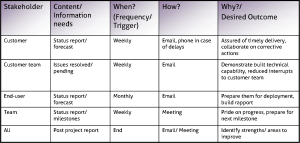Most of us are familiar with the Basic Communication Model – with sender, channel and receiver. We all understand that the responsibility for effective communication rests with both parties, with a slight onus on the sender. What I have experienced is that by including an element, that focuses on the outcome, enhances the effectiveness of communication.
This got highlighted in a serendipitous event for us. We were helping Delivery Managers with competency development in a Automotive client’s organization, it included a module on Communication. We had a written test as part of the program and I had created the question for it, and has evaluated the answers. The test had questions from other areas like Stakeholders, Customer satisfaction and corresponding questions were set by my colleagues. One of them was tabulating the marks and had an interesting observation on my evaluation – that I have either given marks in 75-80% range or 45-50% range, and asked why is it so? I had not noticed this and I reviewed the answer scripts briefly.
Here’s is what I found: The Communication question was a project situation with challenges in dealing and getting responses from the project stakeholders. There was a template suggested for the answer, that had the standard columns like what, who, frequency and a column for desired outcome/ result, the last column is typically not included in the templates. Communication model talks about acknowledgment and feedback, but they are not represented in templates for Project Communication.

Good Communication Plan focuses on Expected Outcome
Interestingly, few had jumped into arriving at a solution without even documenting the “desired outcome” and a few had included this. Invariably, the answers of those who had included this column were significantly better than those who had not. I also noticed that many of them had tweaked their solutions after including this column at the end, it was hand written test. There were a few, who got it right otherwise too.
We shared this observation with the class and from then on, this is one of my favorite stories that I share when training on project/work communication.
Often managers creating a report for stakeholders, assume that their responsibility ends with that, get frustrated when they do not get responses or unable to resolve the issues. They think of creating the report as a chore, and often mentally exhausted. Major shift happens, if they focus on getting responses and resolving issues as the end goal and treat the report as just a means. Those who get this never complain of the boring process of creating reports, as report for them is a step in getting an issue resolved or a problem solved. Most managers pride themselves on their ability to solve problems and issues and this small tweak helps them go raring at it. All this by just focusing on the end/outcome.
